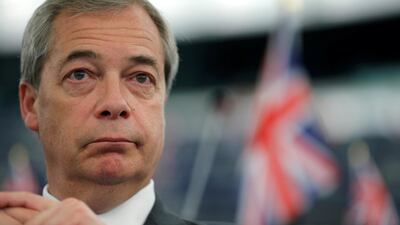British electoral authorities said Friday they had officially recognised a new ‘Brexit Party’ backed by Nigel Farage, a key campaigner in the referendum vote to leave the European Union.
Recognition by the Electoral Commission means the party can now contest elections in Britain – and potentially in the European Parliament if Brexit is delayed beyond March 29.
“The party was founded with my full support and with the intention of fighting the European election on May 23 if Brexit has not been delivered by then,” Mr Farage told the Daily Telegraph newspaper.
He said he would stand for election, adding that the party had received “hundreds of applications” from other would-be candidates, and “significant” funds had been pledged.
“The engine is running,” he said.
In December, Mr Farage left the UK Independence Party (UKIP) which he had co-founded and turned into a hugely influential force as its leader.
He fell out with the current UKIP leadership after it appointed a far-right activist, Tommy Robinson, as an adviser in December. The party is also languishing in the polls.
The Brexit Party “was registered on February 5,” a spokesman for the Electoral Commission told AFP.
It is led by Catherine Blaiklock, a former UKIP official and parliamentary candidate, who told the Telegraph she expected “thousands” of people from the ruling Conservatives to defect.
Prime minister Theresa May is currently trying to persuade MPs to support her plan for a negotiated withdrawal from the EU, but many of her own Conservatives want a cleaner break.
The continued political impasse has prompted speculation Britain could delay Brexit – something hardline eurosceptics oppose.
“I sincerely hope that this prospect is recognised by both the Conservative party and the [opposition] Labour party as a threat,” Mr Farage said of the new venture.
He added: “All they have to do is deliver a proper Brexit – the one which 17.4 million people voted for in June 2016. Otherwise, this threat will turn into a promise.”

